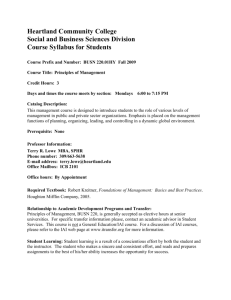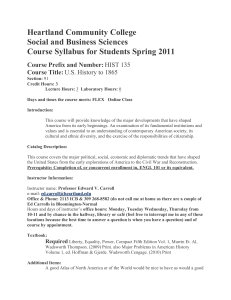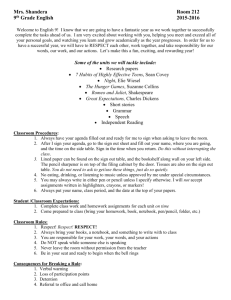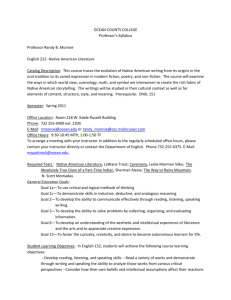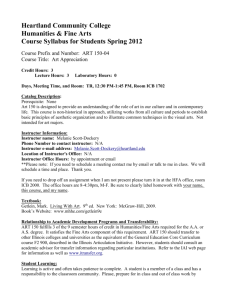ENGL 107 Wethington _master syllabus
advertisement
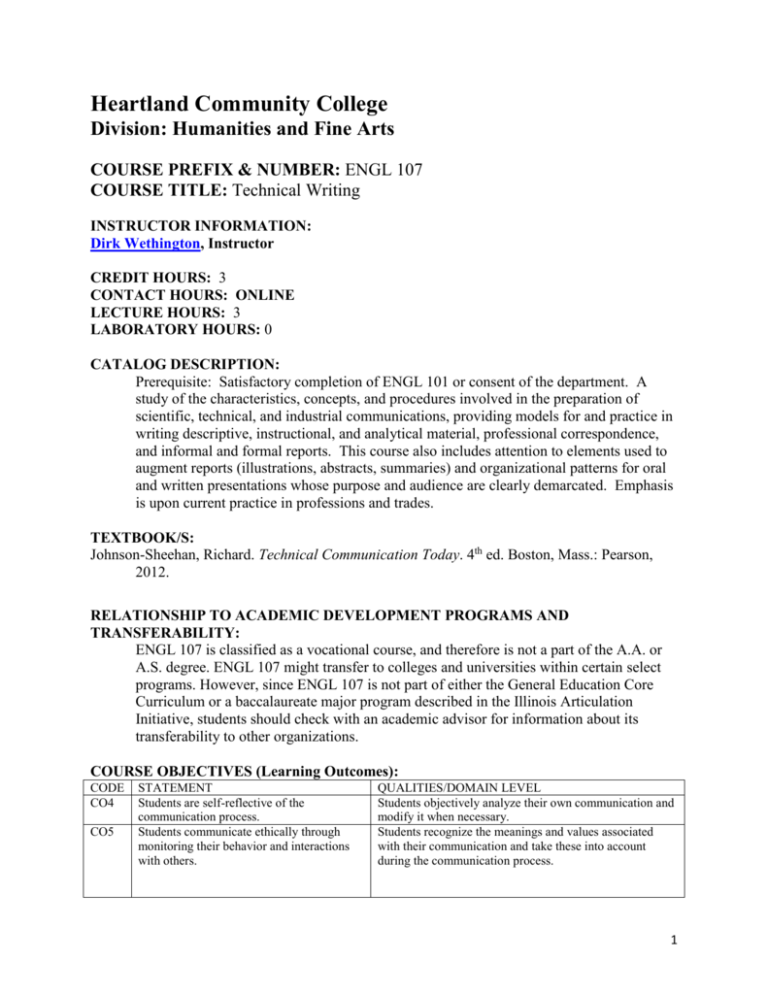
Heartland Community College Division: Humanities and Fine Arts COURSE PREFIX & NUMBER: ENGL 107 COURSE TITLE: Technical Writing INSTRUCTOR INFORMATION: Dirk Wethington, Instructor CREDIT HOURS: 3 CONTACT HOURS: ONLINE LECTURE HOURS: 3 LABORATORY HOURS: 0 CATALOG DESCRIPTION: Prerequisite: Satisfactory completion of ENGL 101 or consent of the department. A study of the characteristics, concepts, and procedures involved in the preparation of scientific, technical, and industrial communications, providing models for and practice in writing descriptive, instructional, and analytical material, professional correspondence, and informal and formal reports. This course also includes attention to elements used to augment reports (illustrations, abstracts, summaries) and organizational patterns for oral and written presentations whose purpose and audience are clearly demarcated. Emphasis is upon current practice in professions and trades. TEXTBOOK/S: Johnson-Sheehan, Richard. Technical Communication Today. 4th ed. Boston, Mass.: Pearson, 2012. RELATIONSHIP TO ACADEMIC DEVELOPMENT PROGRAMS AND TRANSFERABILITY: ENGL 107 is classified as a vocational course, and therefore is not a part of the A.A. or A.S. degree. ENGL 107 might transfer to colleges and universities within certain select programs. However, since ENGL 107 is not part of either the General Education Core Curriculum or a baccalaureate major program described in the Illinois Articulation Initiative, students should check with an academic advisor for information about its transferability to other organizations. COURSE OBJECTIVES (Learning Outcomes): CODE CO4 CO5 STATEMENT Students are self-reflective of the communication process. Students communicate ethically through monitoring their behavior and interactions with others. QUALITIES/DOMAIN LEVEL Students objectively analyze their own communication and modify it when necessary. Students recognize the meanings and values associated with their communication and take these into account during the communication process. 1 DI2 PS3 PS4 CT3 Students consider the views of others in light of those persons’ experiences and particular understandings. Student identifies the type of problem and , from multiple problem solving methods, chooses the best method and solves the problem. Student analyzes the situation, explores different outcomes from multiple frameworks, applies the appropriate solution, and analyzes the results, and refines the solution. Students generate an answer, approach, or solution through an effective synthesis of diverse sources and arguments and provide a rationale. Responding Student tries to apply multiple strategies to solve problems. Student shows ability to solve problems which have not been previously demonstrated by the instructor. Student is not as dependent on the instructor. Student sees problem solving as a process and is not satisfied with first answer to problem—reviews answer for validity. Student transfers problem solving ability across the disciplines. Students use creative thinking to produce a produce, idea, or method that is new to them. (Designing your own) Students completing this course should be able to effectively gather, interpret, and present data in a variety of modes, using structures appropriate to specific audiences and purposes. They should be able to: 1. Identify the specific situations in which a writer needs to summarize material from other writers, and distinguish the principal types of summary, explain the purposes for which each is suited, and write examples of each type. 2. Write clear and precise instructions and explanations of procedures and processes. 3. Write both general and specific descriptions of industrial or professional tools and machinery from a variety of points of view, using accurate and appropriate terminology. 4. Describe the conditions under which terms and concepts need to be defined and write clear definitions appropriate to the knowledge level of a given audience. 5. Write an analytic paper in a manner and structure appropriate to the selected audience and writing context. 6. Write effective, formally correct examples of most common forms of business and professional communication pertinent to the student’s career path. 7. Write formal and informal reports reflecting a variety of modes and purposes. 8. Distinguish between the formal requirements and audience demands imposed by written and oral communication and adapt any written assignments from this course to an effective oral presentation. COURSE/LAB OUTLINE: 2 1. Writing as a Process 2. Collaboration in Writing 3. Writing Summaries and Abstracts 4. Writing Instructions and Specifications 5. Describing Processes 6. Describing Mechanisms 7. Analyzing 8. Evaluating 9. Writing Letters and Memoranda 10. Writing Reports 11. Using Graphics 12. Editing 13. Accessing Information 14. The Role of the Internet METHOD OF EVALUATION: Course grades will be determined as follows: Blackboard assignments, discussions, surveys 70% Final document/manual 30% Final grades will be determined according to the following scale: 92-100% 83-91% 74-82% 65-73% Below 65% = = = = = A B C D F REQUIRED WRITING AND READING: Several major writing projects and regular minor writing assignments. Reading assignments include the textbook and links from the instructor. All assignments and responses will be managed through the Blackboard site for this course. While it’s not out of the question, there are no face-to-face class session currently planned. All course work will be facilitated through Blackboard. I would strongly encourage you to “check in” to the site at least four times a week, more if possible. Online discussions, lecture material and presentations, announcements and assignments will be posted and updated on a weekly basis, and success will require your active participation. Any time you have questions, email me – sooner rather than later. If you have questions about an assignment, are confronting some challenges in completing your work, want some feedback on some work – just let me know. 3 Course Policies: Grading Policy: Grading in this course will be consistent with grading criteria set forth in Policies and Procedures documents and email communications including rubrics for such assignments. Participation: Participation and submission of assignments is necessary for students who wish to improve their technical writing skills. Online Participation: Students will be asked to participate online in small group, and partner discussions as well as turn in written assignments and group work. Incompletes: Consistent with departmental policy; make an appointment with the instructor to discuss whether an individual case qualifies for a course incomplete. Individual units and assignments will be graded as 0/F, not incomplete. Extra Credit: None Make-up of tests and assignments: Students will be allowed to turn in ONLY 2 assignments late (save these for sick days). The final project may not be turned in late. Deadlines: Because your time is valuable, and so is mine, deadlines are firm. If you have to miss a deadline, refer to the “make-up of tests and assignments” policy. Academic Integrity and Plagiarism Academic Integrity Academic integrity is a fundamental principle of collegial life at Heartland Community College and is essential to the credibility of the College’s educational programs. Moreover, because grading may be competitive, students who misrepresent their academic work violate the right of their fellow students. The College, therefore, views any act of academic dishonest as a serious offense requiring disciplinary measures, including course failure, suspension, and even expulsion from the College. In addition, an act of academic dishonesty may have unforeseen effects far beyond any officially imposed penalties. Violations of academic integrity include, but are not limited to cheating, aiding or suborning cheating or other acts of academic dishonesty, plagiarism, misrepresentation of data, falsification of academic records or documents and unauthorized access to computerized academic or administrative records or systems. Definitions of these violations may be found in the college catalog. 4 Plagiarism Plagiarism is the presenting of others’ ideas as if they were your own. When you write a paper, create a project, do a presentation or create anything original, it is assumed that all the work, except for that which is attributed to another author or creator, is your own. Plagiarism is considered a serious academic offense and may take the following forms: 1 Copying word-for-word from another source and not giving that source credit. 2 Paraphrasing the work of another and not giving that source credit. 3 Adopting a particularly apt phrase as your own. 4 Using an image or a copy of an image without crediting its source. 5 Paraphrasing someone else’s line of thinking in the development of a topic as if it were your own. 6 Receiving excessive help from a friend or elsewhere, or using another project as if it were your own. Note that word-for-word copying is not the only form of plagiarism. The penalties for plagiarism may be severe, ranging from failure on the particular piece of work, failure in the course or expulsion from school in extreme cases. [Adapted from the Modem Language Association’s MLA Handbook for Writers of Research Papers. New York: MLA, 1995: 26] Academic Support Center Services: Library The Library, located in the Student Commons Buildings at the Raab Road campus, provides Heartland students with a full range of resources including books, online journal databases, videos, newspapers, periodicals, reserves, and interlibrary loan. Librarians are available to assist in locating information. For more information, please call the Library (309) 268-8200 or (309) 268-8292 Tutoring Services Heartland Community College offers tutoring in various forms at no cost to Heartland students at the Tutoring and Testing Center in Normal and at the Pontiac and Lincoln Centers. Tutors are available at convenient times throughout the week. Study groups are also available by request. For more information about services available at each location, please call the Tutoring and Testing Center in Normal (309) at 268-8231, the Pontiac Center at (815) 842-6777, or the Lincoln Center at (217) 735-1731. Testing Services The Tutoring and Testing Center provides a secure testing environment for students who are enrolled in online, hybrid, and other distance learning courses; have a documented disability; or need to take a make-up exam. Testing accommodations for students having documented disabilities must be arranged by the student through the Office of Disability Services, and Testing Services will only administer make-up exams at the request of the instructor. Contact Testing Services at (309) 268-8231 for more information. 5 Writing Services: Writing Services is open to all HCC students working on their writing. HCC writing faculty help students apply course outcomes to their papers. Visit the Tutoring and Testing Center or call the TTC for an appointment: 268-8231. Open Computing Lab The Open Computing Lab provides free computing for HCC students at convenient times throughout the week. The computer lab is staffed by trained Lab Assistants and offers the use of approximately 70 computers, a scanner, a laser printer, and an electric typewriter. Specifications for written materials: MLA or APA style required (option depending on major). Syllabi disclaimer: The syllabus is subject to revision. 6
